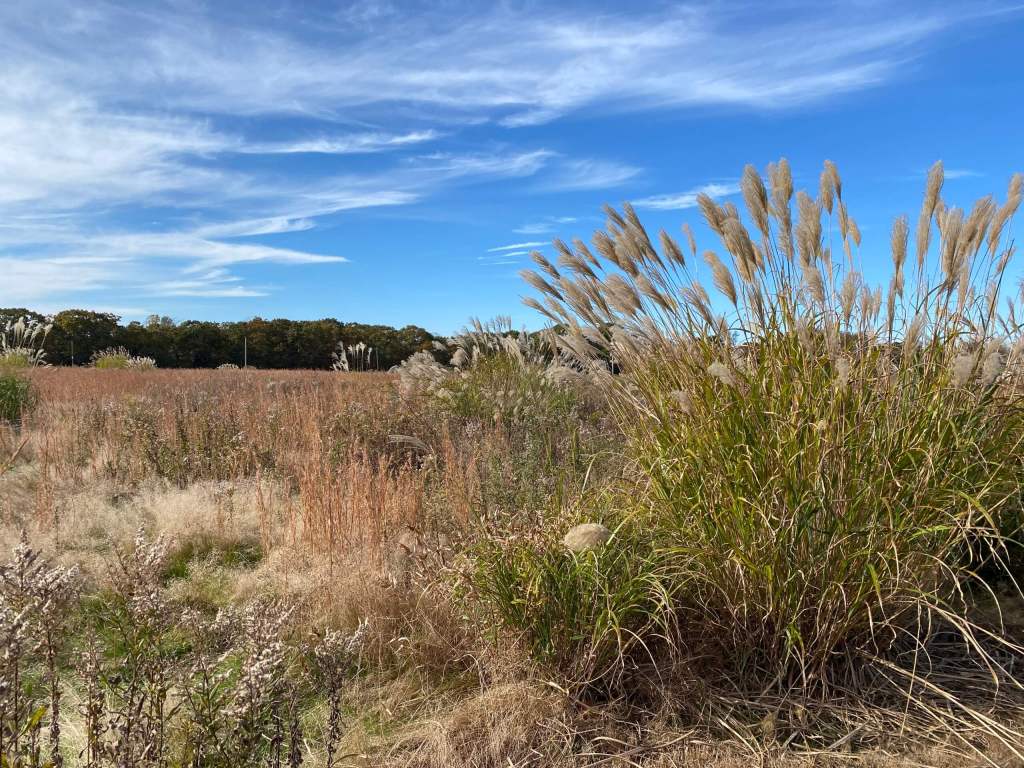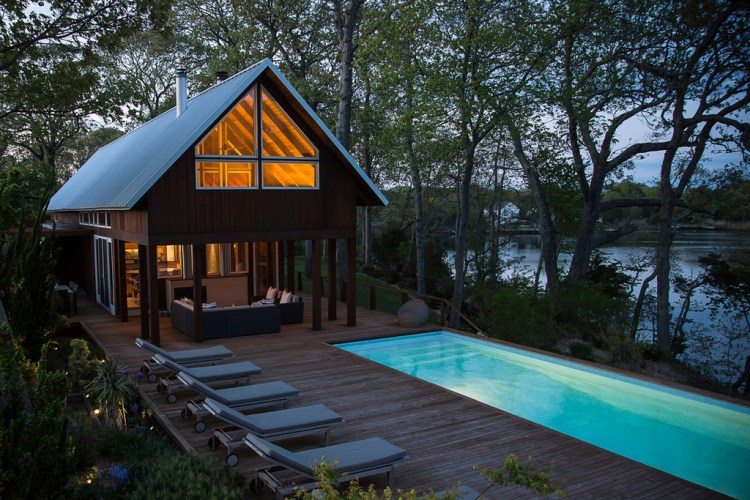Around this time last year, neighbors to 15 acres of North Fork farmland off Deep Hole Creek in Mattituck became aware of plans to develop a seven-lot subdivision there.
It was a devastating thought for those who, like Michelle Roussan, call it “the last little gem left on the North Fork.” The wide-open space, the scenic water vista, the memory of what once was — all in peril.
Concerned community members sprang into action to preserve 4180 New Suffolk Avenue and, despite a booming real estate market and a pandemic, not only hatched a plan with the Peconic Land Trust to permanently protect the property, but have nearly delivered on it.
What began as a seed of community concern blossomed into 120 supporters and donors. In just a few months, $625,000 in community donations have been raised toward the purchase by the Trust, and the Town of Southold has agreed to simultaneously purchase the development rights. The land trust will become the “interim owner” of the property and continue to look for a conservation buyer to purchase the land for the purposes of cultivation.
The Peconic Land Trust is a nonprofit organization that has helped conserve more than 13,000 acres on Long Island since 1983.
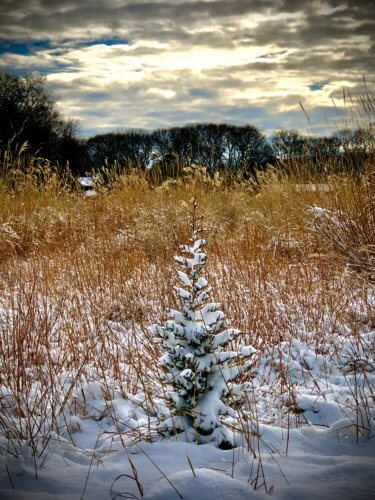
The fundraising is not over just yet: There is still a $280,000 gap that needs to be filled, between contract and closing costs, such as environmental assessments and attorney fees, as well as costs associated with owning the land, such as property taxes and land stewardship for up to a year or more.
“New Suffolk Avenue is one of those iconic North Fork roads,” says Alison Delaney, the development officer at the Peconic Land Trust. Located off Main Road, on the south side of the North Fork, the avenue runs 3.5 miles from the Handy Pantry down to the water.
“A lot of people like to cycle here, bird, kayak nearby, even take a walk,” says Delaney, who also lives in the area.
There are a lot of historic homes in the area, a lot of land already preserved.
“It’s a well-known thoroughfare,” she adds.
The 15-acre parcel at the southeast corner of New Suffolk Avenue and Marratooka Road is the last parcel of undeveloped property along Deep Hole Creek, one of the access points in the area to the Peconic Bay.
In a recent interview, Roussan recalls how when she first came to the United States from France, she and her husband drove by the land. “It was, at the time, a beautiful field of rye,” she says. “I just loved to just look at it in the wind. It reminded me so much of my country — I grew up in open space and farmland. I thought it was just magical this piece of land.”
“Fifty years later, I passed by and saw the potential building of houses. I really freaked out,” she says of the public hearing notice that went up in December of 2020.
As the president of the New Suffolk Civic Association, someone suggested to her that they try and save the land. “I felt as a member of the board of the civic association, protecting the quality of life of our residents is part of our mission,” Roussan explains.
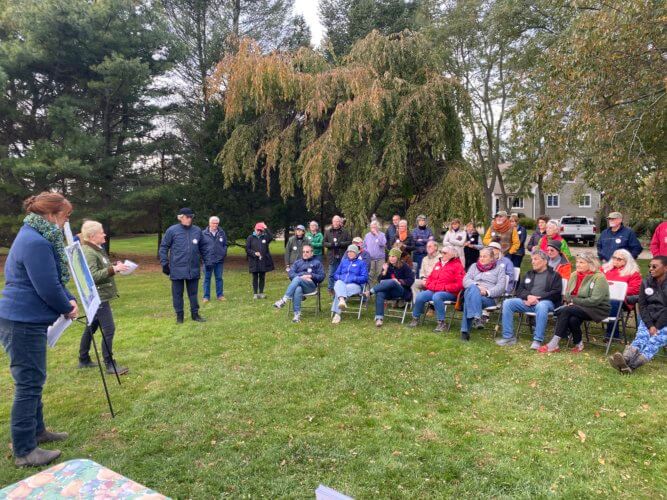
The hard reality is that “with the increased influx of population because of the pandemic and the never-ending desire for a second home there is less and less land on the North Fork,” she says.
A number of community residents joined that virtual public hearing in January of 2021 and realized town approvals were likely. A small group reached out to the Peconic Land Trust for guidance and “it was a snowball effect,” Delaney recalls. There were near-weekly meetings with a steering committee made up mostly of community members.
Something would have to happen quickly if the land was to be preserved. The Koehler family, which owns the property under the Koehler Family Limited Partnership, was far along in the process to subdivide, and the parcel, after a number of years on the market, most recently at $3.3 million, had two offers from developers, according to Delaney. Southold Town was limited in what it could pay to purchase the property and offers from developers meant the price was higher.
The Land Trust does not usually purchase property outright, but instead prefers to assist in obtaining a conservation buyer — someone who will farm the land after purchase. Without such a buyer readily available, the nonprofit stepped in, rather than lose the property to development.
“We had to go to the bank and get funds in order to make this happen on behalf of the community and the town,” Delaney explains.
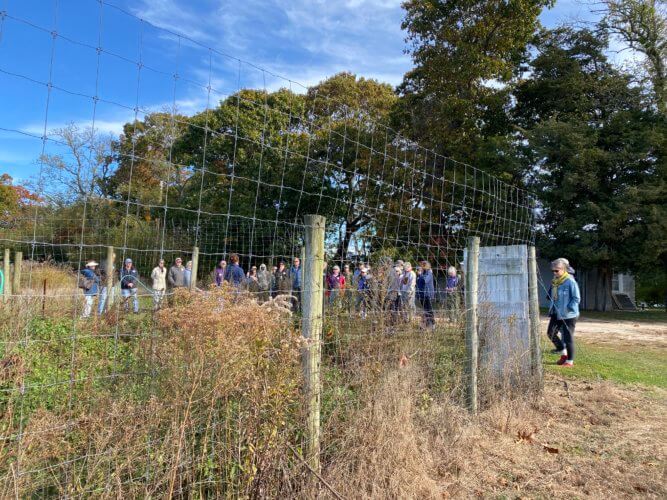
There is a misconception amongst the public that the Peconic Land Trust receives money from the 2-percent transfer tax. It is the municipality that receives revenues from this tax on property sales, through the Peconic Bay Regional Community Preservation Fund, and while the coffers have grown during the pandemic as homes sold at rapid rates, that doesn’t mean the towns are flush with cash.
“The towns are seeing a lot of revenue, but there’s also equally a rush for conservation,” Delaney says.
As home prices rise so has the price of conservation, and municipalities are restricted in that they cannot pay more than the appraised value. The towns also have to weigh different conservation projects. The Town graciously reacted to the community’s desire to preserve this land, she says.
“As fast as their money is coming in, they are trying to allocate it and turning it around. But they can’t move as quickly and agilely as us,” Delaney says.
That is why it was so critical for the community to step forward.
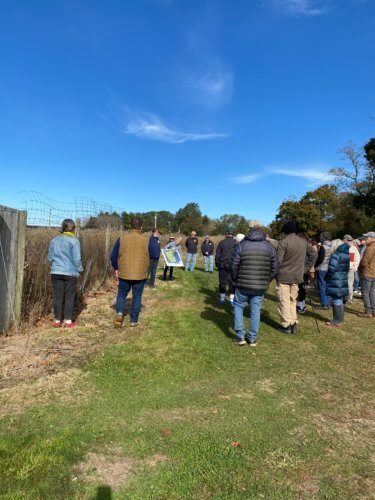
“We conveyed that to the community and they were essentially willing to offset the shortfall,” says Holly Sanford, the project manager for the Peconic Land Trust.
With a willing seller, fundraising quickly began. Pledges and donations were already rolling in by March. Roussan and several other community members helped educate their neighbors by sending out email blasts about their effort and the importance of giving, in both big and small quantities.
“If we bring more houses there, more swimming pools, more pollution, more cars — if we destroy what is natural, we know what happens, the consequence,” Roussan says. “Once you destroy something you cannot get it back, it’s finished.”
Momentum quickly built. The enthusiasm from the community was impressive from the beginning, Roussan says. “We couldn’t give up. Honestly, when we started I never thought we would make it. This was like a dream,” she says. “I guess we had so much energy and so much passion about this project that it became contagious. And it worked.”
Ultimately, the Southold Town Board approved purchasing the development rights. The town will pay $69,000 per acre for approximately 12 acres, according to a resolution earlier this month.
“Projects like this usually take two years, maybe three, but there was such an urgency to this we have really been in overdrive the last 11 months to bring this to fruition,” Sanford says. Because of the offers the seller had, “We had a shorter timeline,” she adds. “We’ve been working non-stop for 11 months.”
The Land Trust went into contract with the Koehlers in September. Sanford and Delaney hope they will be able to close within the next six weeks.
Delaney says well over 100 donors across the North Fork have given or pledged money in a vast range of quantities, from $20 to in excess of $100,000 while interest — and support in terms of dollars — continues to build.
“I think it also speaks to a bit of a moment in time — the increased popularity [of the North Fork], even pre-pandemic, but certainly during the pandemic,” Delaney says. “More people are here and that comes with a lot of benefit and concern from local residents,” she says.
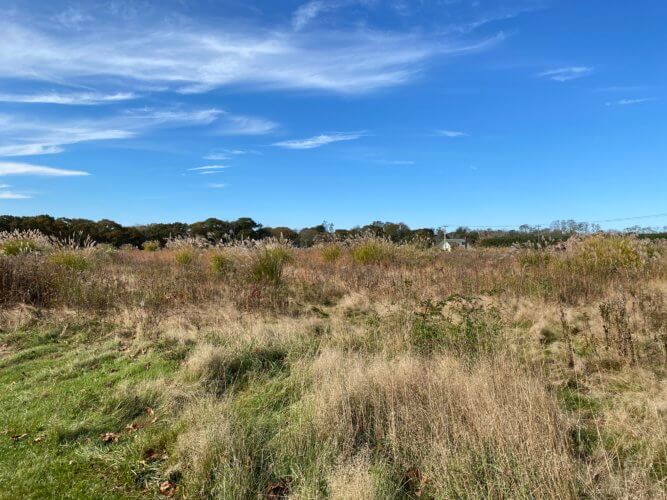
“A lot of folks are at home more than ever, paying attention and seeing parcels like this coming up on the open market,” she says, adding that there is a feeling that if they don’t act now, the land will soon be gone for good.
The average donation is about $2,000, but Delaney says no gift is too little to make a difference. “The strategy we’ve had since the beginning,” she explains, is “If you give $20 and you get 10 of your neighbors to do the same thing and 50 neighborhoods do that across the North Fork . . . couple that with a few more large donations . . . and collectively that will get this where they need to be.”
Delaney also points out that the land trust is accepting pledges, a written promise to donate when the project happens. Some people, she explains, may not have money to give toward the project this year, but they can still pledge an amount for 2022 or even 2023. This allows the land trust to finance the money up front and move forward.
“It’s not too late for this project,” says Sanford. Pledges “will help get us there in the next few weeks.”
Roussan credits Delaney and Sanford for pushing the project forward. “I don’t know if people realize how lucky we are to have an organization willing to make this kind of investment in the community,” she says of the land trust.
“This time of the year, where we have a tendency to write a check, this to me is my number one organization,” Roussan says. “Saving the planet really begins in our backyard.”
For more information visit PeconicLandTrust. org/DHC.
This article appeared in the December 2021 issue of Behind The Hedges. Click here to view the digital edition.

